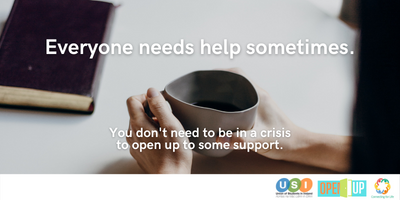It’s important to mind your mental health as best you can all year round, but especially during times of stress, such as exam season. Read on for advice and tips on ways that you can mind your mental health, and sources of support if your stress is getting on top of you. If you’d like more in depth tips and advice, please check out our other posts in the DeStress series.
Take Breaks
It might feel like you need to spend every spare second studying, but taking breaks is important, and more so, it might even help. When you take a break and allow yourself to do and think about things other than college, it allows your brain to percolate on the material you’ve been studying. When you come back from a break, it will help you to feel more focused, better able to concentrate, and better able to remember the material.

Eat Regular Healthy Food
It cant be easy to rely on quick, unhealthy meals and snacks while you are studying and doing exams, but eating healthy is important. The nutrition in healthy foods will help you maintain your energy levels, your ability to study, and will help you keep on top of your mental health too – it helps regulate your endorphins and keep your brain functioning at it’s best. When you do eat, try to take a break to do so.

Stay Hydrated
Drinking water is something we all hear about all of the time, but even a small amount of dehydration can affect your ability to focus and your mood. If you don’t like water, there are other options, but be wary of drinking things with caffeine and sugars in it, especially later in the day.

Maintain Good Sleep Hygiene
Having good sleep hygiene is not just about getting your eight hours of beauty sleep – although getting between 7 and 9 hours will help to ensure you are fully rested and recharged. However, there are other aspects to good sleep hygiene. Try to get to bed at the same time, and have a period of wind-down time beforehand, and avoid screentime during this time if you can as well. Having a routine while winding down can help train your brain to understand that you are preparing for sleep so you will find it easier to fall asleep once you head to bed.
As much as possible, try to avoid studying on your bed so that your mind only associates your bed with sleep. This may not be possible, and if that’s the case, try to ensure you fully clear off your bed when you are done sleeping, and take some time away from the area in between studying and going to bed.

Stay Social
While it might be a good idea to cut down on nights out during exam time, that doesn’t mean you should isolate yourself. Keeping in touch with family and friends, having chats with them on your study breaks and seeing them from time to time can help keep your stress levels lower. Some people even find it helpful to form study groups with their friends, although if you do this, try to make sure you aren’t getting distracted too much.

Reach Out For Help
Your lecturers and tutors are there to help – within reason. While they can’t catch you up on the whole semester if you’ve just realised you haven’t paid attention, they can help if you’re struggling to understand a particular topic, or if you need clarification on something. Similarly, if you are unwell during the exams or having other extenuating circumstances occur, reaching out and letting your lecturers know is important. What is key in all these situations is that the earlier you reach out the better. This is especially important if you are looking for a member of teaching staff to help you with course material, as they may have other teaching duties ongoing and so may not be able to help immediately.
The exam period is stressful for everyone, and some stress is actually healthy – it can motivate us and help keep us going until all the exams are done. However, stress that makes it hard for you to go about your day, or other emotions and feelings that are making it difficult for you to live your life as usual are not ok. If you notice that you are feeling that way, are having consistent trouble sleeping or eating, or that you are unable to engage with your studies no matter how much you try, they are all signs that you should ask for mental health help. There is no shame in feeling that way, and absolutely no shame in asking for help. The college counselling services is a good first port of call. They may have waiting lists but that’s not a reason to not reach out to them; there are other options you can try as well, such as your GP (or the college GP), or any of the organisations listed on this webpage.
It’s ok to feel not ok, but it’s not ok to continue to feel not ok on your own. It’s ok to ask for help, but it’s important to keep asking for help until you get help that is helpful. No exam or grade is worth compromising your wellbeing for. It might feel like the worst thing ever to not get a good grade, or to even fail an exam, but there is always something that can be done. If you are struggling, with exams, or with anything else in your life, talk about it. You are not alone, and you are of value and worthy of help and support.


Recent Comments